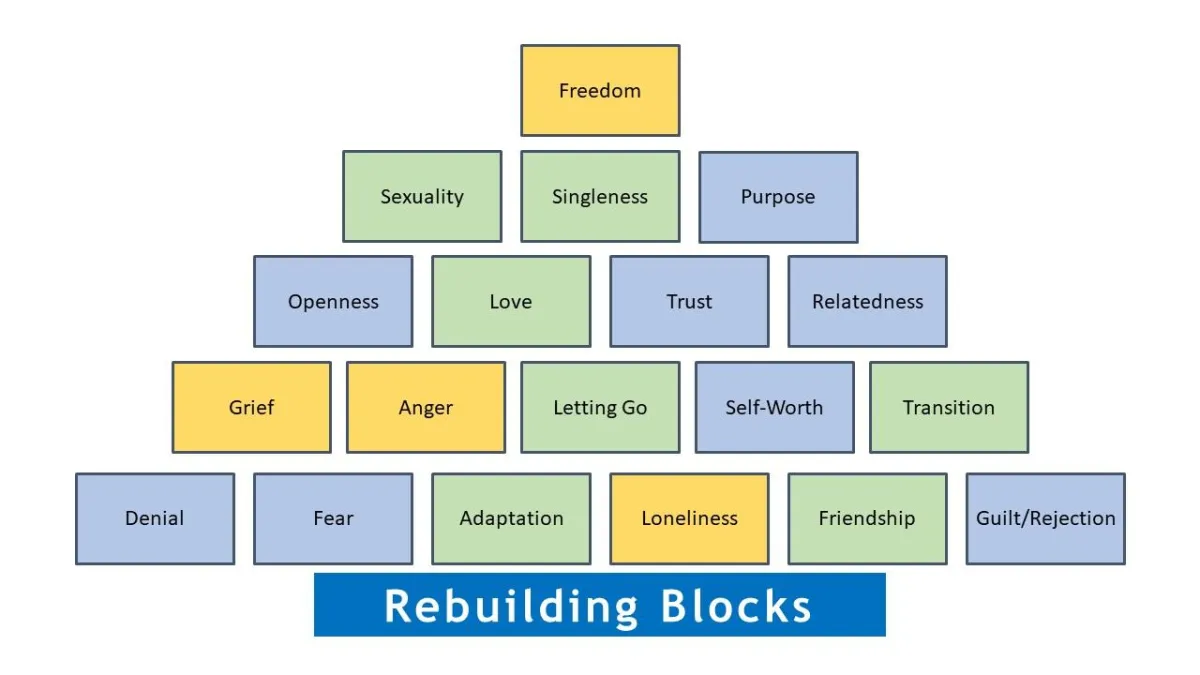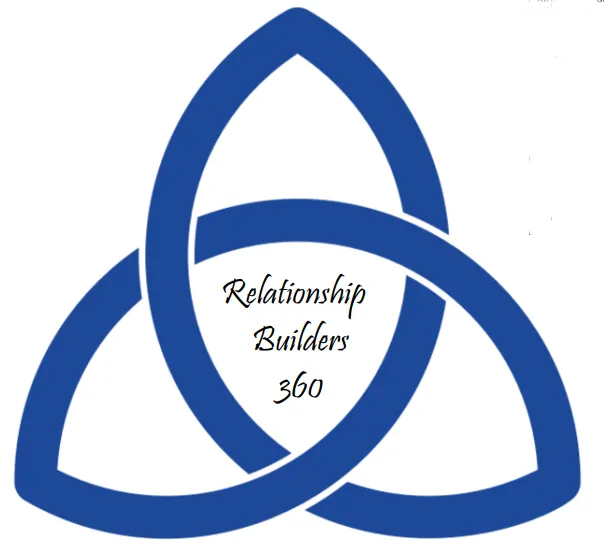The Proven Process
The 4 Stages
The Rebuilding Programs has changed more than 100,000 lives. Now, it's your turn.
The Fisher Rebuilding Seminar was first created in the 1980s by Dr. Bruce Fisher. As he worked privately with people he realized that modern therapeutic methods weren't sufficient. So he began studying the issues to understand what people needed and what information and strategies actually worked.
He eventually simplified the issues in 19 steps for people to work through. Then, he organized them into a logical flow that anyone can follow.
The 19 "Blocks"
Everyone's circumstances of their divorce is unique, but the effects are similar. Dr. Bruce Fisher created a step-by-step structure that walks people through each step or "block". He called this "climbing the mountain". At the top, is freedom. For one person a particular block may take 5 minutes. For another it is "the" block that they are stuck on. By giving you a map and the right guidance from an expert, you are able to rebuild your life, very quickly.

The 4 Phases
The 19 steps can be daunting to people that are overwhelmed. Rest assured that it isn't as hard as it looks. In fact the process can be simplified into 4 major phases.
01
Thinking
Our thoughts can create our suffering. Having the right mindset and learning how to shift your thoughts so that you are the victor, not the victim is life changing. When you are in control you are strong and resilient.
LEARN MORE
02
Feelings
Anger, grief, loneliness, shock, anxiety and more are feelings. Yet most people don't really know WHAT they are feeling, nor how what to do with it. When you allow yourself to turn toward your feelings you are more alive and engaged. What you feel is real!
LEARN MORE
03
Identity
Many people "lose themselves" in their relationships. Then, when the relationship ends they simply don't know who they are. By reconnecting with yourself, maybe for the first time, you become centered and solid. You are authentically you.
LEARN MORE
04
Relationships
The first 3 phases set the foundation for this phase. They are directed inside. The last phase is about your connections with others. You will learn how to build healthy, meaningful and deeply satisfying relationships.
LEARN MORE
WITH THE 10-WEEK GROUP PROGRAM YOU WILL RECEIVE:
30 Hours of Live, In-class Learning
Class Materials: Including a textbook and workbook (over 200 pages of printed information)
Access to a video library so that you can learn and grow on your own schedule as well.
Weekly calls with your peers to give and get support from others also committed to recovery.
Regular social activities outside of class.
2 30-Minute private calls with your facilitator (one at the beginning and one at the end)
Let's Start Rebuilding. Together.
You don't have to do this alone. You aren't the only one going through this. With the right combination of community, coaching, and content you can dramatically rebuild your life. You can be happy and looking forward to the next chapter. How will you Rebuild?
Stay up to date
Ready to continue Rebuilding and Building? Stay up to date on the latest news, articles, and blogs.

In Pursuit of Wellness
In Pursuit of Wellness

When you think about health care, what comes to mind? For some, it’s a pursuit of wellness connecting mind, body, and spirit. For others, health care is like a car’s transmission – you don’t really notice or appreciate it until it’s making a noise, or completely broken.
People in the middle of a crisis or transition in a significant relationship can feel especially stressed, which we all know affects our health. Some may find themselves both ill and alone for the first time.
My name is Beth, and I am writing a series of articles designed to help you navigate today’s complex health care system. I am a nurse by training, but several years ago I became interested in the study of “quality” care – especially for patients who are in the hospital. None of what I write will be an endorsement for a particular hospital or care system, nor is any of the content meant to recommend any course of treatment. Simply, I will be giving you information so that you can make educated choices about your own health care. I invite your comments and conversation.
Whether you have visited your local emergency department, or provider/physician clinic, or have been a patient in the hospital recently, you may have received a “patient satisfaction survey” in the mail. The survey often contains questions about the timeliness of your visit, how the food was, or whether it was quiet at night. Most surveys ask about whether your provider or nurse communicated information about your medications or care plan in ways you could understand.
Many insurers, including the federal government (aka Medicare) require certain types of providers or organizations to collect and publicly report the results of these surveys. If you have a specific comment, whether it’s a kudos or complaint, those are forwarded straight to the provider for an opportunity for a direct response to you.
Soon, there will be an additional set of questions that will be included in hospital patient satisfaction surveys. The three new questions are part of a bundle called “Care Transition Measures”. Simply, hospitals are required to prepare you for discharge – whether you are going back home or on to another care setting (like a nursing home). And for good reason! Medicare is now financially penalizing certain hospitals for re-admissions of certain patients within 30 days. Unnecessary re-admissions are costly and dangerous for patients and the health care system.
Let’s have a look at the questions:
Question 1: During this hospital stay, staff took my preferences and those of my family or caregiver into account in deciding what my healthcare needs would be when I left.
Question 2: When I left the hospital, I had a good understanding of the things I was responsible for in managing my health.
Question 3: When I left the hospital, I clearly understood the purpose for taking each of my medications.
Hospitals will be scored on the number of questions that received a “Agree” or “Strongly Agree” in each of the questions multiplied by the number of patients that were eligible to receive a survey. Hospitals will be focusing more and more on equipping patients and their families or other caregivers in how to manage their health issues outside of the hospital. They will work hard to teach and communicate with you, and ask you several times whether you understand what they are trying to show you.
You and your caregivers have the responsibility to speak up, ask questions, and otherwise seek out information, until you are sure that you understand. Are going through a significant change in a relationship, to the extent that you are managing your health all by yourself? You should ask around to find out who might help serve as a healthcare “buddy” for you. Someone who at least knows the basics about where your medication list is, or who your regular provider is. Someone you can call on when you are ill, or who might be okay with listing their name as a contact person should you become hospitalized.
Transitioning out of the hospital can be tricky, whether you are going home or to another care setting. It’s important to have another set of ears, and perhaps another voice if you are not able to speak for yourself. Hospitals are paying attention to how you will be able to cope after you leave. You should do all you can, too.
Contact Us
You’ve already come a long way. Let’s reach the next level together.

Email: info@relationshipbuilding360.com
Address:
6402 Odana Rd,
Madison, WI 53719
Phone:
608-204-6076
